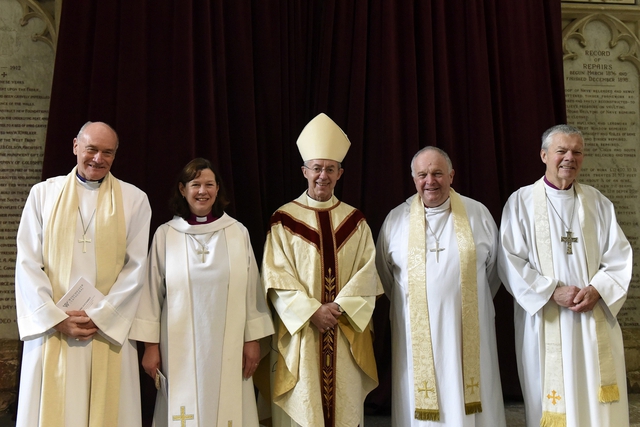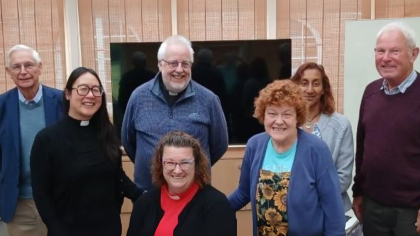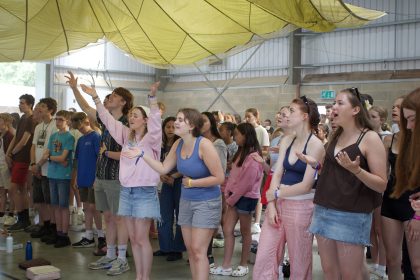At the invitation of the Dean and Bishop Debbie, The Archbishop of Canterbury, the Most Rev Justin Welby, paid a pastoral visit to Winchester Cathedral on Sunday to commission the episcopal team in the Diocese of Winchester.
During the service, Archbishop Justin prayed for and commissioned the Bishop of Southampton, the Rt Rev Debbie Sellin, the Bishop of Basingstoke, the Rt Rev David Williams, and two other associate bishops who are supporting them in their roles.
Further details are available here: https://winchester.anglican.org/news/2022/01/11/archbishop-confirms-arrangements-following-bishop-winchesters-retirement/
Watch Archbishop Justin’s sermon here:
Full Transcript
The heart of both the readings we have heard today are two core aspects of the Christian life: relationship and abundance. Both are qualities that God brings as gifts to be received. Both are far too often forgotten in the formal processes of Christian institutions and in the interactions within the Church as an organisation – at least to the extent that one can refer to anything as disorganised as the Church of England as an organisation. Happily disorganised. I don’t believe in organisational tidiness. The last years in the Diocese of Winchester and especially 2021 have been characterised by difficult relationships and by disappointment, leading to anger and indeed to crisis.
When such things happen in the midst of an enormous national disaster, like the Covid 19 Pandemic leading to the death of so far around about 175,000 people and so many more who’ve suffered, then the sense of anger and disappointment is far greatly accentuated by the immense strains of dealing with the disease that makes life unpredictable, events uncontrollable and relationships uncertain. In such times every disappointment becomes a mountain. Anger burns, more fiercely. And there is a deep sense of things being out of order.
Within the life of the Church, unlike a secular organisation such as a business, the response must involve God first and foremost, for all the issues of Church life are spiritual issues: broken relationships; necessary confrontations; divisions, and how we respond to them, are all fundamentally spiritual questions. The impact of them is felt spiritually by our prayers being impeded, and by diminished joy in Christ and His life. Restoration is found in new confidence, not in any one person or even group of people, but in the God, who calls and equips them, and in the whole body of Christ – and that means every Christian person, both within the Church of England and outside it.
John’s Gospel, the wedding at Cana, begins with a shame-filled failure. The obvious question was, what do we do now? We’ve run out of wine. Perhaps they had no money for more wine. Perhaps it was outside Palestinian licensing hours. Perhaps they’d drunk the village dry.
But they were in an honour/shame culture. And in an honour/shame culture, shame is something that sticks with you, for decades, in the memory, ‘That was the wedding where the wine ran out’. And what happens is the first of three transformations. The second one, we all know about – the water was turned into wine.
The first is the transformation of the problem from a ‘what’ question, to a ‘who’ question. That is the first change of heart that we see. Whom we follow is the answer. And in Mary’s words, we do whatever he tells us. The question was not ‘what do we do’, but ‘whom do we obey’. This move of ‘what’ to ‘who’ sounds obvious, but it requires a profound change of heart – a conversion of life. Everything in us, especially when we are part of a large and ancient organisation like the Church, and especially in this country and this culture, calls us to plan and organise. Many of you will be, or have been in, roles where you are expected to plan and organise.
Strategy matters, of course it does. But relationships with each other that reflect the intimacy of the love of God that is lavished so abundantly on us, those relationships matter far more. The disciples, and for that matter, the servants, are not invited to know what to do to change water into wine (and what a lot of wine, by the way. If you, in a bored moment in the next few minutes you calculated, you’ll work out it’s roughly 1800 bottles – to save you the trouble) but the servants and the disciples are shown a sign of who this is, who changes the entire creation, changing darkness into light, despair into hope… shame into grace.
As always in Scripture, every detail matters. In telling us who this is, who does this, who Jesus is, the first point is it’s a water for purification, the Old Testament rights of cleansing. It is turned into the wine of rejoicing, of celebration and that is the call and purpose of God for every human being and for this Diocese and for each person in it, that we rejoice in being loved by God, who knows us perfectly.
Most of us don’t rejoice much at being loved by ourselves, because we know ourselves. Many of us struggle with relationships. But there is one who knows us better than anyone else – including ourselves; knows us at depths that we can’t imagine. And that is God and his love to you and me is abundant and overwhelming.
Because it is abundant, this transformation. It’s characteristic of Jesus’s ministry, above all in John’s Gospel. There is abundance. John says, in chapter 10 verse 10, he quotes Jesus as saying, ‘I have come to bring life, and to bring it abundantly’, much too much for us to consume and need more.
It’s seen in the food given in John chapter 6 at the feeding of the 5,000 when there are baskets and baskets left over. It’s seen in the pouring out of the promised Holy Spirit after the resurrection, and in John 21 in the ludicrously great catch of fish. It is above all a sign of the nature of who you and I are called to follow. It is to bring us not only to wonder at the generosity of God to his people, at the generosity of God to sinners, but it is also to bring us to life. The life of the Holy Spirit.
And that is the whole purpose of the whole of John’s Gospel. As John says, at the end, that this is written that you may have life, for bishops Debbie and David, for Bishop Richard, for the Dean and Chapter for the senior staff team, for every person in this Diocese, Lay and Ordained.
The question, after the difficulties of recent years, must not be ‘What do we do first? It must be ‘Who is this we follow?’
Paul in the Epistle to the Corinthians, our Epistle reading, is writing to a Church that was suffering greatly. Not from persecution but from self-inflicted wounds. They were divided into factions according to which leaders they supported.
They were divided doctrinally, over issues like the resurrection, that minor aspect of Christian life, as well, of course, being the Church, over issues of sex.
They were divided, socially between rich and poor. They were divided again in another honour/shame culture by a sense that certain gifts of the Spirit made them more important than other people.
They sound quite like many Churches today.
Paul’s response is to say that all we are, all we own, everything we receive, comes from God, and is given graciously and abundantly to us because it is for the common good. Every Christian is gifted by God with what the Church needs.
When someone does not bring their gifts into the life of the body of Christ, all lack. It doesn’t matter who you are from the youngest child to the longest serving person in the Diocese, from an Archbishop, even, to someone who’s just last week come to faith in Christ.
And the purpose of God’s equipping of every Christian is not to point us to ‘what we do’, but to ‘whom we follow’. It is, if you look back at that Epistle and at that reading, it is about the Spirit, the ‘who’. The right question is not primarily, what does God call and equip people for, it has to be asked, but the right, first question is, WHO does the calling and equipping point to. The ‘what’ question matters, but only after the ‘who’ question is put central
Whom does Winchester Diocese follow? Whom do its great gifts, remarkable story, long journey, and vast potential point to? The answer is Jesus Christ, through him to God, the Holy Trinity. If the desire of the diocese is for Christ, then it will find abundant life, joy, gifts, and energy, it will be healed and renewed, it will glorify God.
If on the other hand, it is for things for actions first, if it is principally about what’s gone wrong and what to do next, and who’s to blame then it will find none of what it seeks: healing restoration, hope, joy… Healing and planning will be necessary, but not to take the place of a desire for Christ.
I pray for you, and implore you to say not just in the future, ‘we were re-established’; but we were filled with the Holy Spirit by God the Trinity and sent out to share the healing and restoration that Jesus brings to a society that too often a society acts as if God was a leisure interest.
If desire for Christ is first, then all your hopes will be met, and all your desires satisfied and the whole Church of Christ will be lifted up.
You will find abundant grace, relationships healed, joy overflowing. And incidentally, the life of the Church will be a party as good as any in Cana.





